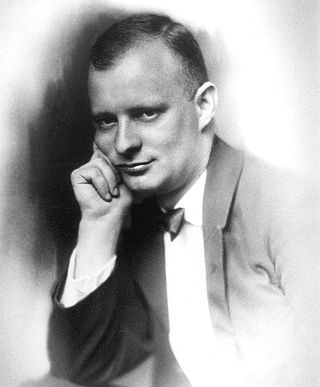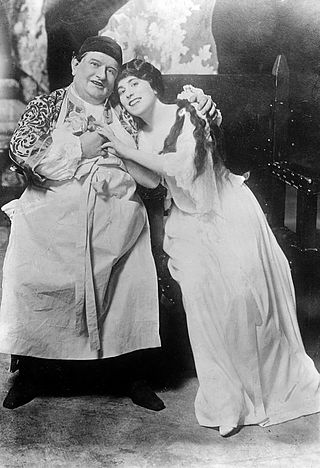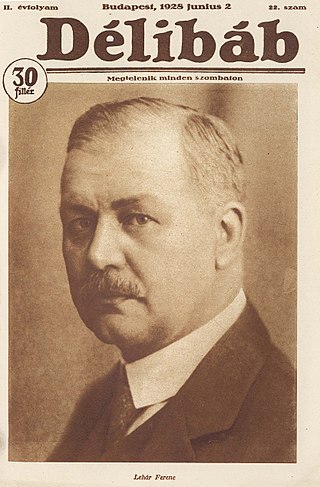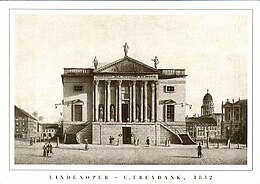This is a list of music-related events in 1816.

Carl Heinrich Graun was a German composer and tenor. Along with Johann Adolph Hasse, he is considered to be the most important German composer of Italian opera of his time.

The Staatsoper Unter den Linden, also known as the Berlin State Opera, is a listed building on Unter den Linden boulevard in the historic center of Berlin, Germany. The opera house was built by order of Prussian king Frederick the Great from 1741 to 1743 according to plans by Georg Wenzeslaus von Knobelsdorff in the Palladian style. Damaged during the Allied bombing in World War II, the former Royal Prussian Opera House was rebuilt from 1951 to 1955 as part of the Forum Fridericianum square. Nicknamed Lindenoper in Berlin, it is "the world´s oldest state opera" and "the first theater anywhere to be, by itself, a prominent, freestanding monumental building in a city."
The year 1704 in music involved some significant events.

Faust is an opera by the German composer Louis Spohr. The libretto, by Joseph Karl Bernard, is based on the legend of Faust; it is not influenced by Goethe's Faust, though Faust, Part One had been published in 1808. Instead, Bernard's libretto draws mainly on Faust plays and poems by Friedrich Maximilian Klinger and Heinrich von Kleist. Spohr's Faust is an important work in the history of German Romantic opera.

Neues vom Tage is a comic opera in three parts by Paul Hindemith, with a German libretto by Marcellus Schiffer.

Gustav Hölzel was an Austro-Hungarian bass-baritone and composer who sang in the opera-houses of Austria, Germany and elsewhere for nearly fifty years. He is principally remembered as the first Beckmesser in Richard Wagner's Die Meistersinger von Nürnberg.

L'honestà negli amori is a dramma per musica in 3 acts by composer Alessandro Scarlatti. Written in 1679-1680 when Scarlatti was 19 years old, it was his second opera. The opera uses an Italian language libretto that was written by either D F Bernini or Domenico Filippo Contini. The work premiered at the Teatro di Palazzo Bernini in Rome on 3 February 1680. The opera was performed again in 1682 in Acquaviva delle Fonti at the Palazzo De Mari with Acquaviva laureata a serenata composed by Giovanni Cesare Netti. The opera has since been almost entirely forgotten, except as the source of the aria ‘Già il sola dal Gange’.

L'amore medico is an opera in two acts by composer Ermanno Wolf-Ferrari. Based on Molière's comedy L'Amour médecin, the work uses an Italian language libretto by Enrico Golisciani. It premiered in a German version by Richard Batka on 4 December 1913 at the Hoftheater in Dresden under the title Der Liebhaber als Arzt.

Paganini is an operetta in three acts by Franz Lehár. The German libretto was by Paul Knepler and Bela Jenbach.
Romeo und Julia is an opera in two acts by Heinrich Sutermeister. The composer wrote the libretto, after Shakespeare's Romeo and Juliet.
Janet Williams is an American soprano who has won international critical acclaim for performances at the Metropolitan Opera, Berlin Staatsoper, Paris Opera, Théâtre des Champs-Élysées, Opera de Lyon, Nice Opera, Théâtre Royal de la Monnaie, Opera Geneva, Frankfurt Opera, Cologne Opera, Leipzig Opera, San Francisco Opera, Washington Opera, Dallas Opera, and Michigan Opera Theatre as well as in concerts throughout Europe, North America, Canada, Israel and Japan with conductors including Vladimir Ashkenazy, Daniel Barenboim, Myung-whun Chung, Philippe Herreweghe, René Jacobs, Marek Janowski, Neeme Järvi, Raymond Leppard, Fabio Luisi, Sir Neville Marriner, Nicholas McGegan, Zubin Mehta, Kent Nagano, John Nelson, Donald Runnicles, Gerard Schwarz and Michael Tilson Thomas.
Robert Gambill is an opera singer (Heldentenor).
Der Kirschgarten is an opera in four acts by the Swiss composer Rudolf Kelterborn. The German-language libretto was written by the composer and is based on Gudrun Düwel's German translation of Anton Chekhov's 1904 play The Cherry Orchard. The opera was composed between 1979 and 1981 and premiered on 4 December 1984 at the Zürich Opera House to inaugurate the newly renovated theatre. The premiere production was conducted by Ralf Weikert and directed by Nikolaus Lehnhoff. Evelyn Lear created the pivotal role of Ranevskaya.

A basso porto is an opera in three acts by composer Niccola Spinelli. The opera uses an Italian language libretto by Eugene Checchi which is based on Goffredo Cognetti's 1889 play O voto. The opera premiered to critical success at the Cologne Opera on April 18, 1894, sung in a German translation by Ludwig Hartmann and Otto Hess. The work is widely considered Spinelli's greatest composition, and the prelude to the opera's third act has been programmed by numerous orchestras for performances in concert.

Maria Carbone was an Italian operatic soprano. She created the lead female roles in two of Gian Francesco Malipiero's operas: the title role in Ecuba and Cleopatra in Antonio e Cleopatra.
Iris Vermillion is a German operatic mezzo-soprano. A member of the Deutsche Oper Berlin from 1988, she has enjoyed an international career, appearing in Amsterdam with Nikolaus Harnoncourt and at the Salzburg Festival, among others.

Cleopatra is an 1876 opera by Lauro Rossi to a libretto by Marco D'Arienzo based on Shakespeare's Antony and Cleopatra. The opera was first performed on 5 March 1876 at the Teatro Regio in Turin.










